You’ll find the sweet spot for bass fishing rod length falls between 7 and 7’6″ feet, offering excellent versatility across most situations. This range balances casting distance with accuracy while providing good control for various lure weights. Your height matters too—taller anglers can handle longer rods comfortably, while shorter fishermen benefit from more compact options. Shore fishing typically requires longer rods for distance, whereas boat fishing favors shorter lengths for maneuverability. Understanding these factors will help you make the perfect choice.
TLDR
- A 7-foot rod offers the best versatility for most bass fishing situations, balancing casting distance and accuracy.
- Shore fishing requires longer rods (8-10 feet) for distance, while boat fishing benefits from shorter rods (6-7 feet).
- Heavy cover fishing needs shorter rods (6-6.5 feet) for precision and maneuverability in tight spaces.
- Heavy lures over ½ ounce require longer rods (7-8 feet) for optimal casting distance and performance.
- Light lures (1/16 to 1/4 oz) work best with shorter rods (6-6’8″) for enhanced sensitivity and control.
Understanding Bass Rod Length Fundamentals
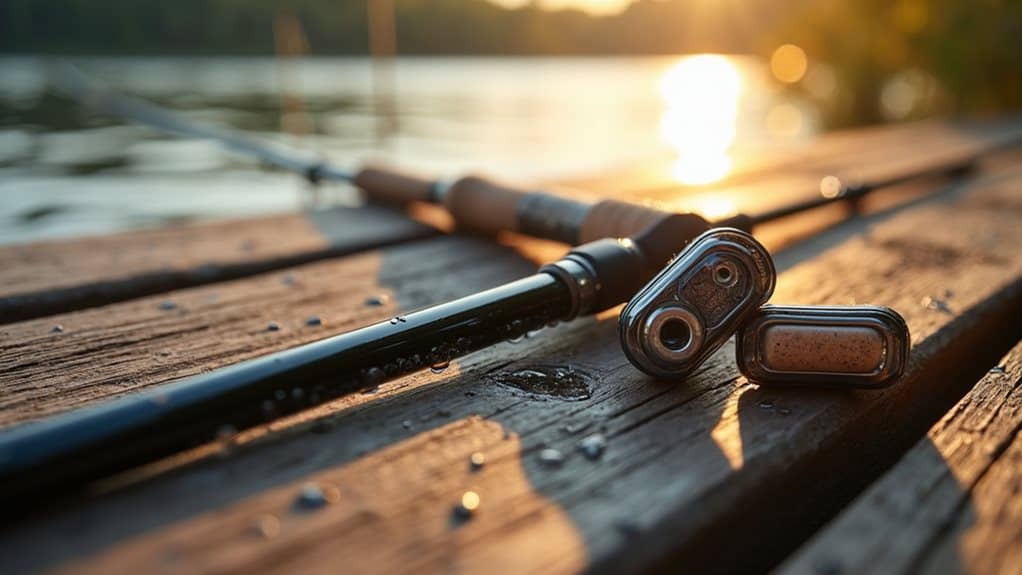
When selecting the ideal rod length for bass fishing, understanding how this fundamental characteristic affects your casting distance, accuracy, and overall control becomes essential for success on the water. Rod length directly influences your ability to reach distant targets, maneuver in tight spaces, and handle different lures effectively, making it a critical decision that impacts your entire fishing experience. A 7-foot rod provides exceptional versatility for bass anglers, adapting well to various fishing situations and techniques you’ll encounter on the water. Additionally, having the right braking systems can enhance your overall casting performance and precision.
How Your Height Affects Rod Selection
Your physical height plays an essential role in determining the most effective rod length for your bass fishing success, as it directly impacts your casting mechanics, comfort level, and overall control on the water. Taller anglers around 6’4″ handle longer rods (7’3″ to 7’6″) comfortably, while shorter anglers near 5’6″ benefit from compact rods that reduce fatigue and improve accuracy. However, many experienced anglers argue that fishing style ultimately matters more than height when selecting the optimal rod length for bass fishing. Additionally, the material choice of the rod can significantly affect its sensitivity and durability, making it an important factor to consider regardless of height.
Balancing Casting Distance With Accuracy
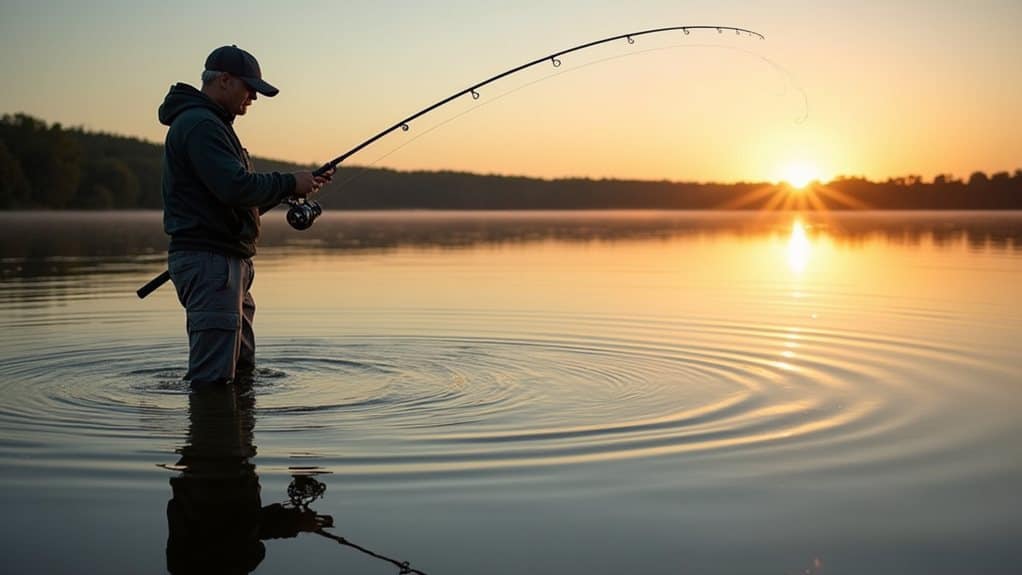
Finding the sweet spot between casting distance and accuracy represents one of the most critical decisions you’ll face when selecting a bass fishing rod.
Medium-length rods around 7 feet offer an excellent compromise, providing sufficient advantage for distance while maintaining manageable control for precise placement.
Your fishing environment and target species should ultimately guide this balance. Additionally, consider incorporating a built-in GPS for better navigation to your favorite fishing spots.
Matching Rod Length to Your Fishing Environment
Your fishing environment plays an important role in determining the ideal rod length for bass fishing success.
Whether you’re casting from shore or working from a boat will greatly influence your rod selection, as will the amount and type of cover you’re traversing.
These environmental factors directly impact your casting efficiency, lure control, and overall fishing effectiveness, making it necessary to match your rod length to your specific fishing conditions. Additionally, understanding water resistance ratings can help you choose a rod that withstands wet conditions and enhances your fishing experience.
Shore Vs Boat Fishing
When you’re selecting the ideal rod length for bass fishing, the environment where you’ll be casting makes all the difference in your success on the water.
Shore fishing demands longer rods between 8-10 feet for maximum casting distance and clearing obstacles.
Boat fishing requires shorter 6-7 foot rods for better maneuverability in confined spaces and reduced snare risk.
Heavy Cover Considerations
Beyond the basic shore-versus-boat decision, heavy cover fishing presents its own unique set of rod length challenges that can make or break your bass fishing success.
You’ll need shorter rods (6-6.5 feet) for precision in tight spots like lily pads, while longer rods (7+ feet) provide the power necessary to extract bass from thick vegetation effectively.
Lure Weight Compatibility and Performance
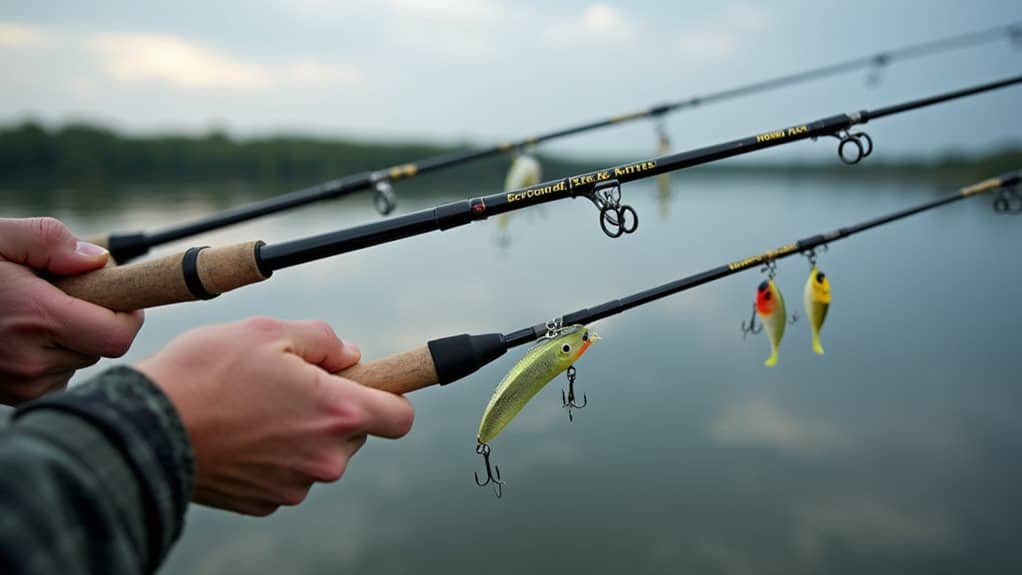
Your rod’s length must match your lure weight to achieve ideal casting performance and fish-fighting capability.
Heavy lures require longer rods that can load properly and generate the power needed for distance, while lighter presentations demand shorter, more sensitive rods that respond to subtle movements.
Understanding this relationship between lure weight and rod length will help you select the right setup for each fishing situation you encounter.
Heavy Lure Rod Requirements
Three key factors determine the ideal rod length for heavy lure bass fishing: lure weight compatibility, casting distance requirements, and fishing environment conditions.
You’ll need rods handling lures above ½ ounce, typically in medium-heavy to heavy power classifications.
Longer rods between 7-8 feet provide superior casting distance and hook-setting advantage, while shorter options under 6’6″ excel in tight cover situations.
Light Lure Casting Needs
While heavy lure setups demand longer rods for power and distance, light lure casting presents an entirely different set of requirements that favor precision over raw casting power.
You’ll find rods between 6 to 6’8″ excel with lures ranging from 1/16 to 1/4 oz, providing the sensitivity and control needed for finesse presentations while maintaining adequate casting distance.
Shore Fishing Vs Boat Fishing Rod Requirements
When choosing the right rod length for bass fishing, the fundamental difference between shore and boat fishing creates distinct requirements that’ll directly impact your success on the water.
Shore fishing demands longer rods between 8-9 feet for casting distance and advantage, while boat fishing benefits from shorter 6-8 foot rods that offer better control and reduced fatigue.
Heavy Cover and Precision Casting Considerations
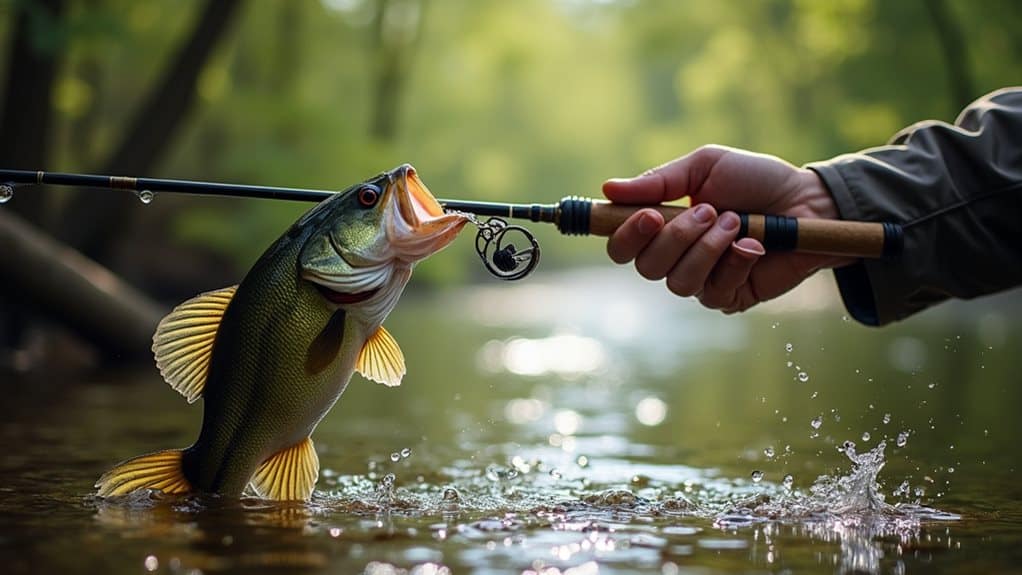
Maneuvering heavy cover presents unique challenges that require careful consideration of rod length and casting precision to maximize your bass fishing success.
Short rods from 6′ to 6’6″ excel in tight spaces, offering superior maneuverability around docks and overhanging trees. You’ll achieve better accuracy when pitching jigs into pockets, while reducing snag risks compared to longer rods.
Versatile Mid-Length Rods for All-Around Performance
Three key factors make mid-length rods the go-to choice for most bass anglers: they deliver excellent casting distance, maintain precision accuracy, and provide sufficient power for hook sets without becoming cumbersome.
Ranging from 6’6″ to 7’4″, these versatile rods excel with various lures—jigs, spinnerbaits, cranks, and swimbaits—while reducing fatigue during extended fishing sessions.
Choosing the Right Rod Length for Your Fishing Style
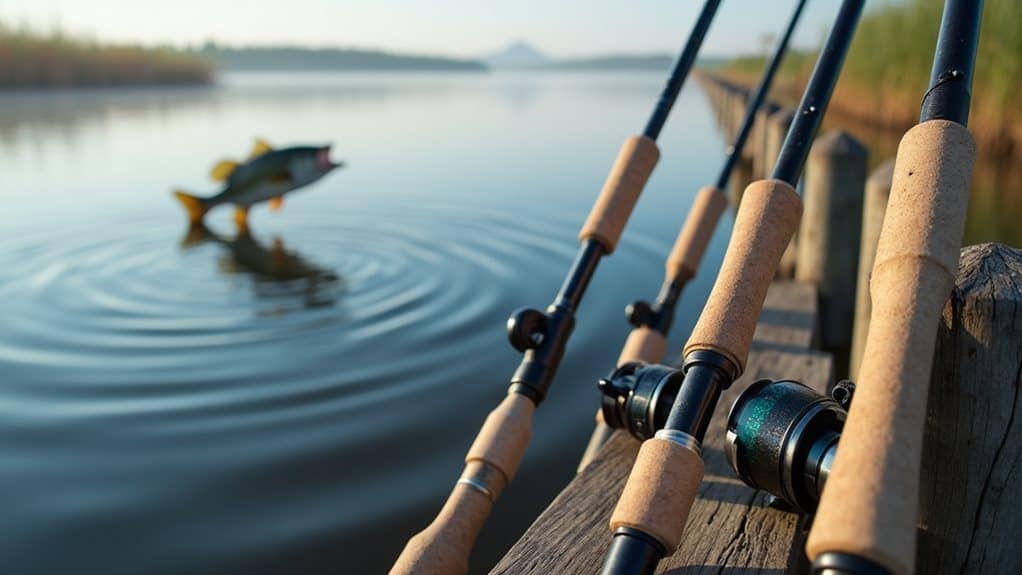
While mid-length rods offer excellent versatility, your specific fishing approach should ultimately determine which rod length works best for your success on the water.
Consider your typical fishing environment, target techniques, and physical comfort. Shore anglers benefit from longer rods for distance, while boat fishermen often prefer shorter models for maneuverability in confined spaces.
Final Note
You’ll find success with bass fishing by matching your rod length to your specific needs. Consider your height, casting style, and fishing environment when selecting between 6’6″ to 7’6″ rods. Medium-length rods around 7 feet offer excellent versatility for most situations, while shorter rods excel in tight spaces and longer ones maximize casting distance. Remember, there’s no single perfect length—choose based on your dominant fishing conditions and personal comfort.




